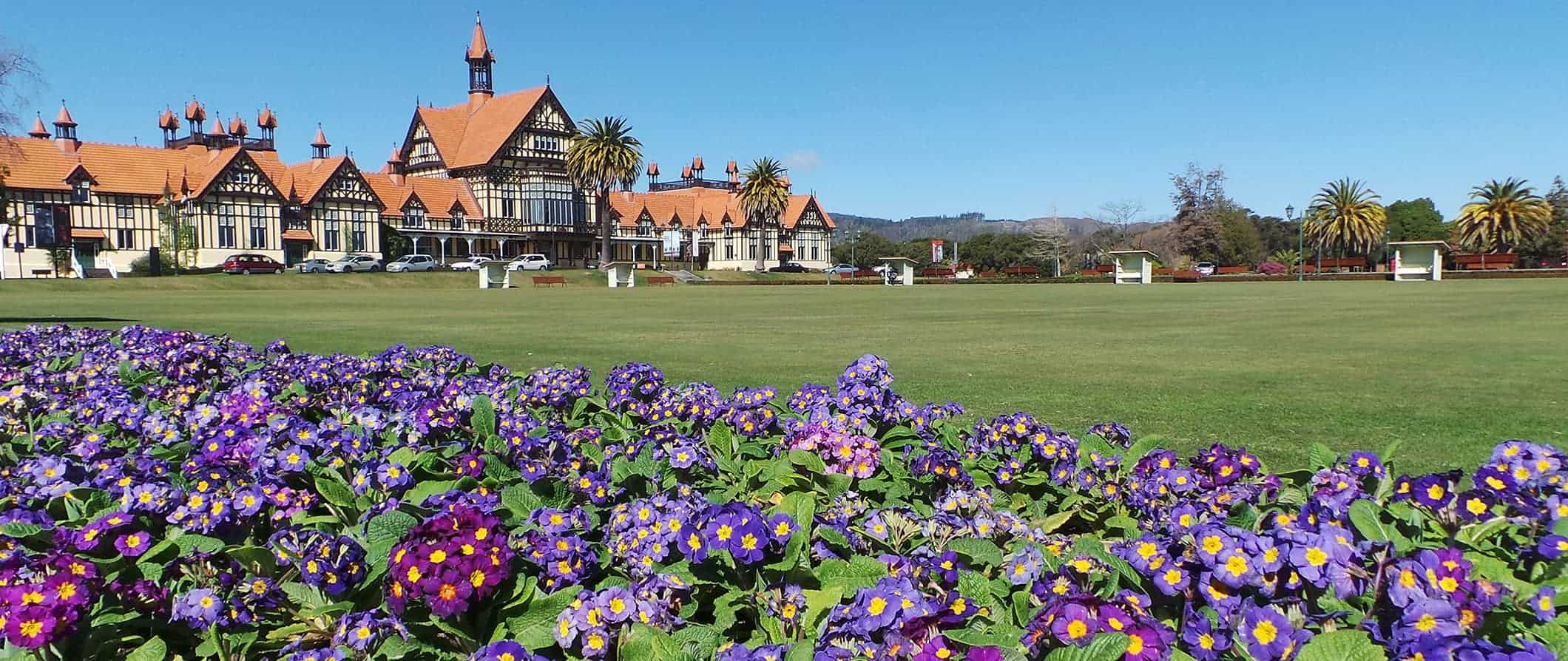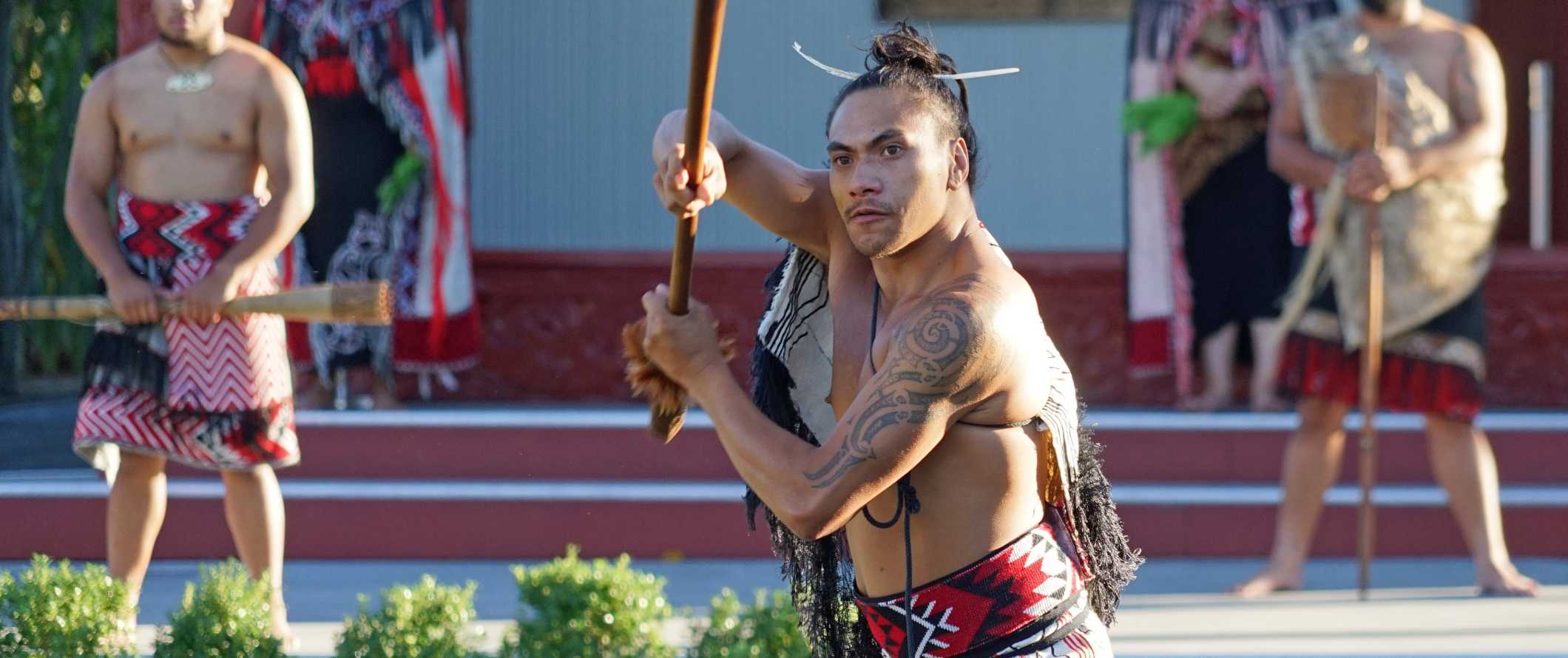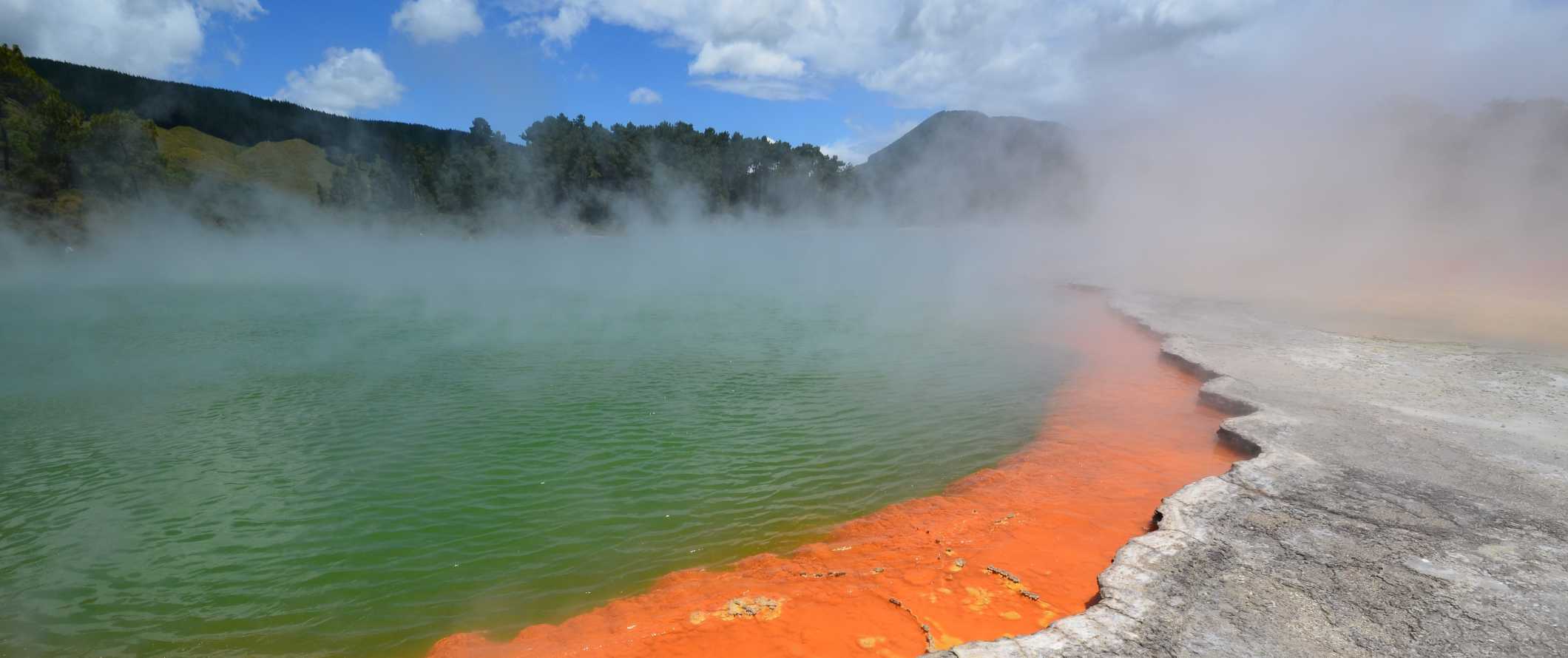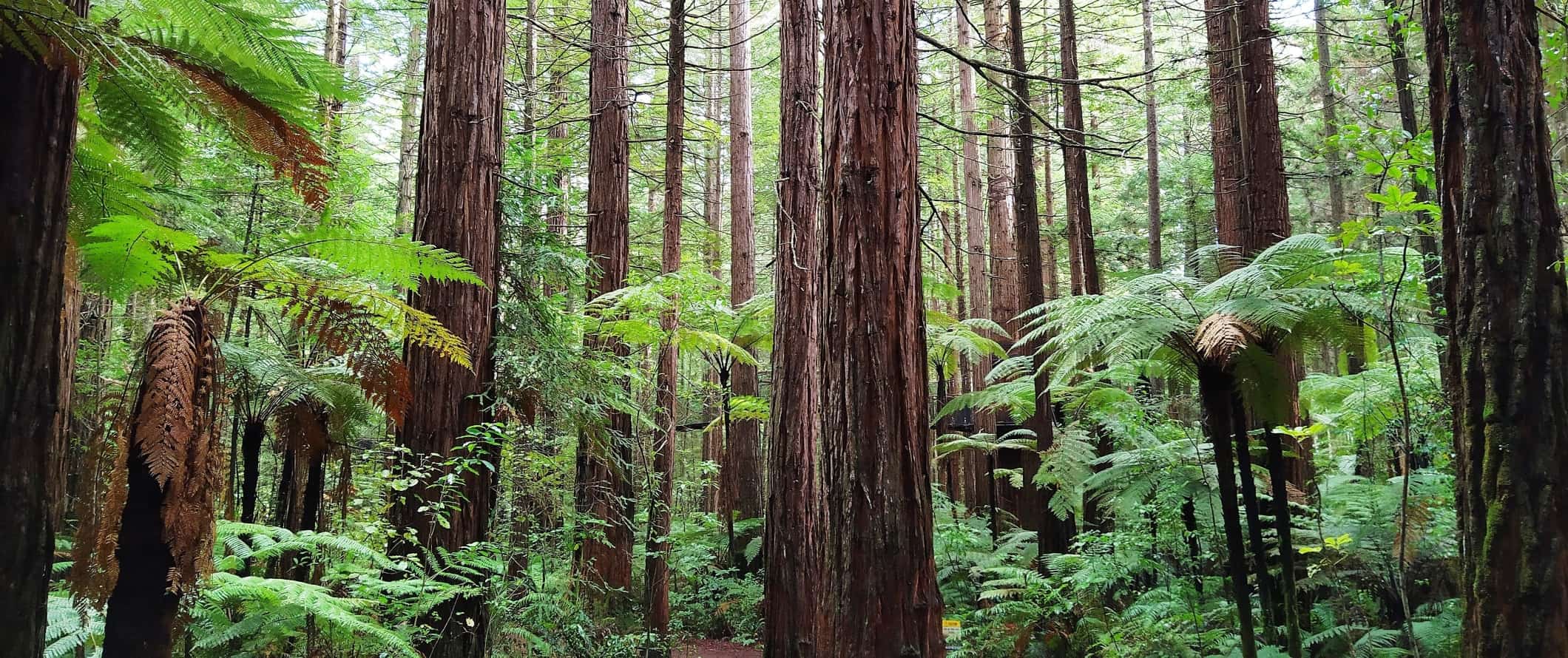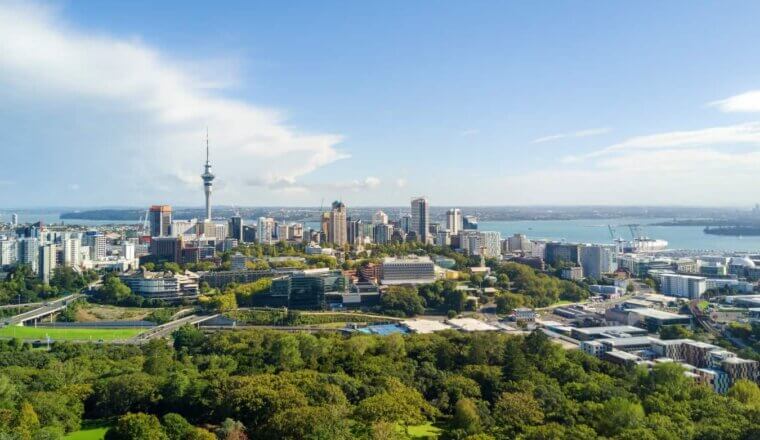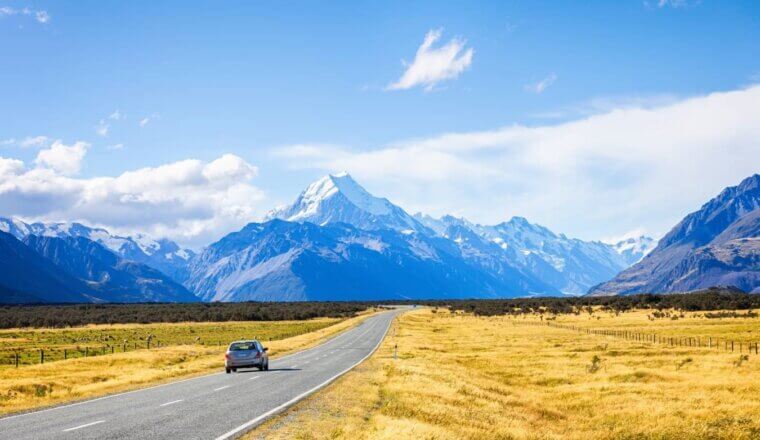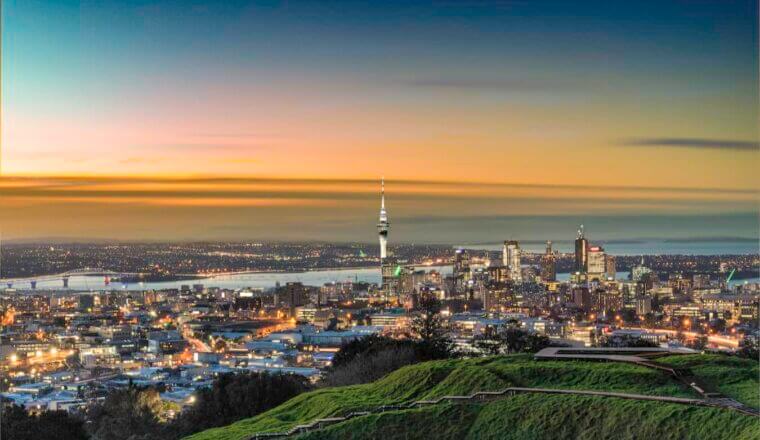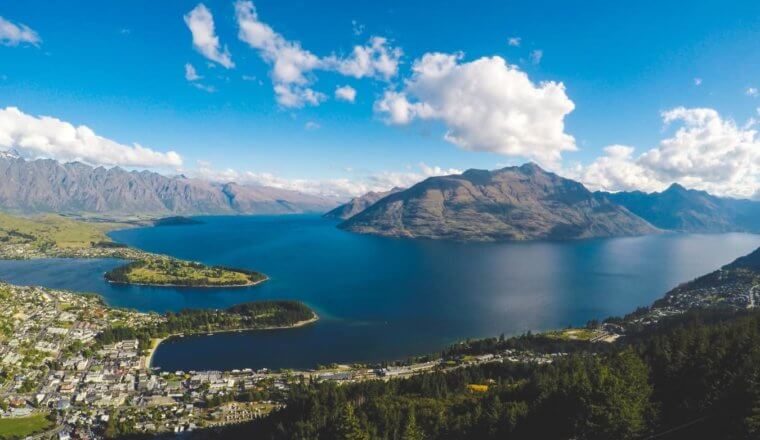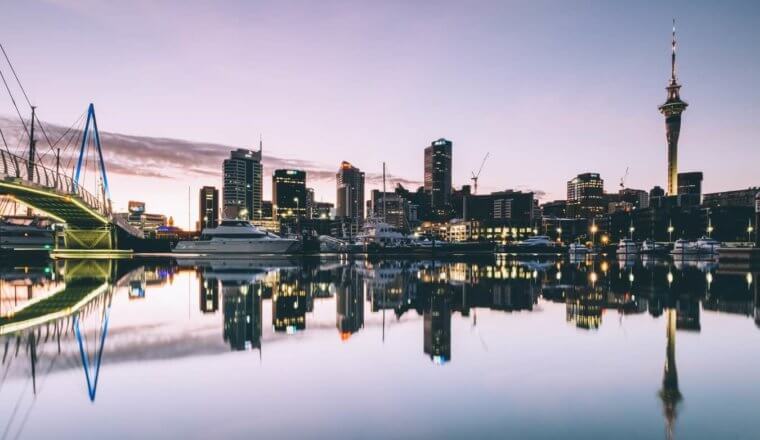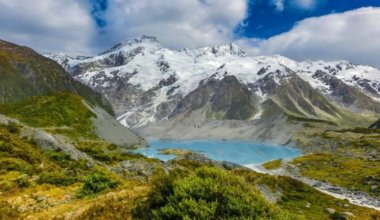Rotorua (which comes from the Maori “Te Rotorua-nui-a-Kahumatamomoe”) is one of the most popular tourist destinations on the North Island. Located in the Bay of Plenty region, tourists have been visiting here since the 19th century, flocking to the region to bathe in the geothermal hot springs. The dynamic geothermal landscape makes for exciting nature walks, Maori cultural experiences, trips to smelly geysers, and soaks in luxury spas.
Everything from restaurants to accommodations is centrally located around a few streets as Rotorua is a small town. Since it’s a small place, you only really need a couple of nights here to get your fun in. I didn’t feel the need to stay and linger. See everything and then head out!
This travel guide to Rotorua can help you get the most out of your visit and save some money along the way!
Table of Contents
Top 5 Things to See and Do in Rotorua
1. See the Whakarewarewa Thermal Reserve
This living Maori village is home to the Tuhourangi Ngati Wahiao people, who have been living in the area since at least the 14th century. The village, which has been welcoming tourists since the 1800s, is set against a backdrop of erupting geothermal activity. You can tour the village and walk the trails around the geothermal area, which is full of geysers, including the Pohutu Geyser, the largest geyser in New Zealand. Prices start at 40 NZD and a guided tour is included. If you just want to walk around the geothermal area by yourself, it’s 30 NZD.
2. Get to know Maori culture
Rotorua and the area surrounding it is the best area to learn about Maori culture,. The cultural tours all are similar, with slight differences (some are smaller, some have better food, etc.) so only see one. Te Pa Tu, a four-hour evening experience of feasting, dancing, singing, and more is highly recommended and costs 245 NZD. You can also visit the New Zealand Maori Arts and Crafts Institute (located within Te Puia, part of the aforementioned Whakarewarewa Thermal Reserve) to learn more about traditional carving and weaving techniques that are preserved to this day.
3. Go to the spa
Soaking in the therapeutic waters of Rotorua has attracted tourists to the area for more than 200 years. The first bathhouse at the Polynesian Spa opened in 1882, and today there are 28 different geothermal pools to enjoy at the spa, including private sky view pools, public pools, family pools, and a full range of spa services. Admission starts at 25 NZD. Another fun spa option is Hell’s Gate in Rotorua’s most active geothermal area. You get to bathe in the mud baths and then soak in hot springs after. Tickets are 59-99 NZD depending on which baths you choose.
4. Explore Whakarewarewa Forest
Whakarewarewa Forest is a sprawling 5,260 hectares (13,000 acres) and provides a stunning environment for horseback riding, mountain biking, hiking, and more. The Redwood Grove has endless walking trails, while the variety of riding surfaces makes for some epic biking (there are more than 70 trails). Admission is free. If you’re new to mountain biking, there are several operators in the area that offer tours and classes starting at 150 NZD (including bike rental).
5. Visit the Buried Village
This ghost town, officially named Te Wairoa, was founded by Europeans and Maori in 1848. It was swamped with ash when the nearby Mt. Tarawera erupted in 1886, killing 120 people. Here you can explore the remains of the village and the archaeological excavations, see artifacts that survived, and learn about the history and the eruption. It is a 20-minute drive from Rotorua and admission is 30 NZD.
Other Things to See and Do in Rotorua
1. Go Zorbing
This New Zealand-invented activity is popular with backpackers. You get put into a giant see-through ball and rolled down a steep hill. You also have the option to add water to your ball. Zorb experiences start at 40 NZD per person. There are also group options available, where up to three people can ride in one Zorb ball.
2. Visit the Rotorua Museum
Located inside an expansive early 20th-century Elizabethan Revival bathhouse, this museum has exhibits on the culture and history of the area. There is also an important collection of over 2,000 Maori artifacts. Admission is 20 NZD for adults. Note: The museum is temporarily closed for earthquake strengthening restorations and is scheduled to re-open in 2025.
3. Wander through the Government Gardens
This is a beautiful public park near the Sportsdrome (a sports arena) and is an important place for the local Maori. The Maori people gave 20 hectares (50 acres) of the land here to the Crown, which has been turned into a large garden and nursery. It’s also home to the Blue Baths, an elaborate Elizabethan Tudor style bathhouse that has been around for over a century which now hosts local weddings and events.
4. Do a canopy tour
These three-hour tours take you on zip lines and swing bridges through the nearby prehistoric forest (which is home to 1,000-year-old trees). You’ll learn about the native birds and plant life found in the forest along the way. Groups are always fewer than ten people and excursions from Rotorua Canopy Tours cost 169 NZD per person.
5. Hike around Mount Tarawera
Mount Tarawera is an awe-inspiring volcano, known for its violent 1886 volcanic eruption. Nowadays, the sleepy mountain and its lake serve as a getaway for people looking to hike or kayak. Because the Maori consider the mountain a sacred site, you’ll have to book a tour with Kaitiaki Adventures as they are the only company allowed to drive up the mountain. Their crater walks and geothermal tours start at 185 NZD for a five-hour tour.
6. See Velocity Valley Adventure Park
Get your adrenaline rush at Velocity Valley, home to the world’s only human-powered monorail racetrack where you can race your friends. You can also try the Rotorua Bungy, hop aboard the Agrojet for the fastest jet boat experience in the country, or free-fall in the wind tunnel at Freefall Xtreme. Experiences start at 55 NZD.
7. Relax in Kuirau Park
Kuirau Park is at the northern end of Rotorua and is New Zealand’s only public geothermal park. Follow the walking trails leading down to bubbling, steaming pools of geothermal activity, and observe nature at work from behind the safety of the security fences. Take advantage of the free Kuirau Park Footbaths while you’re here.
8. Raft the Kaituna
Just outside Rotorua, the raging Kaituna River offers Grade 5 white water rafting. Thrill-seekers can hurtle over the 7-meter (23-foot) Kaituna waterfall, the tallest rafted waterfall in the world. There are a variety of rafting companies to choose from with excursions starting at 105 NZD per person.
9. Enjoy the lakes of Rotorua
While Lake Rotorua is the largest in the area, there are 14 scenic lakes surrounding it making for lots of aquatic adventures. Hop aboard a traditional paddle steamer and cruise around Lake Rotorua (tickets for an hour-long cruise on the Lakeland Queen start at 19 NZD). Swim, relax, and barbecue with friends on Lake Tikitapu, a small circular lake known for its vivid blue color a 15-minute drive from Rotorua. You can enjoy the hot water beach and geothermal pools at Lake Tarawera on Te Rata Bay beach by hiking the trail from Buried Village.
10. See Mokoia
This tiny, uninhabited island is located in the center of Lake Rotorua. It’s a sacred place for Maori as the location of one of their most important legends (the story of the forbidden lovers Hinemoa and Tutanekai). Today the island is a wildlife refuge and home to several rare and endangered bird species. As stewards of the land, there is only one Maori operator that runs tours of the island, starting at 75 NZD.
For more information on other destinations in New Zealand, check out these guides:
Rotorua Travel Costs
Hostel prices – A bed in a 4-6-bed dorm costs 29-35 NZD per night. Hostels are smaller here, so there aren’t many dorms larger than that. Private rooms start at 80-95 NZD per night for a double room with a shared bathroom. Free Wi-Fi is standard and most hostels have kitchens so you can cook your own food.
For those traveling with a tent, there are campgrounds in the area costing at least 15 NZD per night for a basic plot without electricity (with room for two people).
Budget hotel prices – Budget hotels start around 150-175 NZD per night. Free Wi-Fi is standard and a few hotels include breakfast.
Airbnb is widely available in Rotorua with private rooms starting at 60 NZD per night. For an entire home or apartment, expect to pay at least 125 NZD. Expect to pay double that if you don’t book early.
Average cost of food – Eating out is not cheap in New Zealand and Rotorua is no exception. Expect most restaurants to serve dishes consisting of seafood, lamb, fish and chips, and burgers. Maori Hangi (a traditional meal cooked underground) is served at all the Maori shows, with prices starting at around 160 NZD for a meal and performance.
Most meals here cost 20-25 NZD for a main (such as a burger) at a typical casual restaurant. Seafood dishes start at around 30 NZD. For a three-course meal with a drink, expect to pay around 40 NZD.
You can find sandwiches and meat pies for around 8-10 NZD and, even in a small place like Rotorua, there are lots of inexpensive Chinese, Thai, and sushi restaurants ranging from 12-17 NZD for a main dish. Fast food like McDonald’s or Burger King costs around 14 NZD for a combo meal.
A beer out at the bar costs around 8-11 NZD, a glass of wine is 11-13 NZD, and a cocktail is around 16-18 NZD. For non-alcoholic drinks, a cappuccino or latte costs around 5 NZD, and bottled water is 2 NZD.
If you choose to cook your food, plan to spend around 75 NZD per week on basic foodstuffs like rice, pasta, vegetables, eggs, chicken, and some meat.
Backpacking Rotorua Suggested Budgets
If you’re backpacking in Rotorua, expect to spend 75 NZD per day. This budget covers a hostel dorm, public transportation, cooking your own food, and mostly free activities like hiking and visiting Whakarewarewa Forest. If you plan on drinking, add 10-20 NZD per day.
On a mid-range budget of 205 NZD per day, you can stay in a private hostel or Airbnb room, eat out for most meals at inexpensive places, enjoy a few drinks at the bar, do more paid activities (like zorbing or canopy tours), and take the occasional taxi to get around.
On a “luxury” budget of 415 NZD or more per day, you can stay in a hotel, eat out for all your meals, enjoy more drinks, do a Maori cultural show, and rent a car to get around. This is just the ground floor for luxury — the sky is the limit here!
Rotorua Travel Guide: Money-Saving Tips
Like the rest of New Zealand, costs can rack up quickly in Rotorua. Here are a few ways to save money when you visit:
- See the free geysers – A lot of people pay to visit Te Puia, and while the hot springs and geysers there are nice, you can walk around town and see plenty for free. Save your money for a Maori show.
- Cook your own food – Restaurants in New Zealand are not cheap. If you want to save your budget cook your own meals. It’s not fancy, but it will save you a ton!
- Stay with a local – While there are not many Couchsurfing hosts available in the area there are still some. Try staying with a local to cut down on your accommodation costs. You’ll also get some valuable insight into the area from a local!
- Stay in a campervan – Exploring New Zealand via campervan is a popular way to save money and Rotorua is very motorhome friendly. Download the Campermates app to find campsites, gas stations, and dump stations.
- Avoid the high season – Prices will be higher during the summer months (December through February) so avoid peak tourist season if you can!
- WWOOF it – WWOOFing is a great way to work for your accommodation and food. In return for working on a farm or B&B, you get free food and board. It’s a popular activity with travelers because it lets you stay in a place cheaper and longer. You can do it for a few days or a few months. Keep in mind that most farms will require you to have some experience, as too many inexperienced workers have caused trouble in the past.
- Find cheap activities – The bookme.co.nz website provides last-minute discounts on activities (and pub crawls) throughout the country. Most of the activities are last minute, but if you’re flexible in when you want to do things, you can save up to 60% off attractions! I can’t recommend it enough.
- Hitchhike – If you’re heading out of town, hitchhiking is common and surprisingly easy on the main roads. It’s perfectly safe too! HitchWiki has helpful tips for hitchhiking in New Zealand.
- Bring a reusable water bottle – The tap water is safe in New Zealand so bring a reusable water bottle to save money and reduce your plastic consumption. For extra security, use a LifeStraw bottle as it has a built-in filter to ensure your water is always safe.
Where to Stay in Rotorua
There are only a few hostels in Rotorua since it’s a small town. Here are my recommended places to stay:
How to Get Around Rotorua
Rotorua is small and can be walked easily (it takes about 20 minutes to walk from end to end). Here’s how to get around while you’re here:
Public transportation – The bus system is called the Rotorua Urban. It has 11 bus routes that run seven days a week. A one-way fare costs 2.80 NZD. With a Bee Card (a prepaid card you can purchase for 5 NZD) you can lower your fares to 2.24 NZD.
Day passes are 7 NZD.
Bike rental – Bike rentals are available for 60 NZD per day. E-bikes start at 120 NZD per day.
Taxis – Taxis here are super expensive. Rides start at 3 NZD and go up 2.90 NZD per kilometer. Avoid them! if you can!
Ridesharing – Uber is now in Rotorua and it’s generally cheaper than taxis. Prices add up fast though so skip them if you can.
Car rental – Car rentals aren’t super cheap here, usually costing around 50 NZD per day for a multi-day rental. However, having a car gives you the flexibility to explore the surrounding area, so if you can split the cost with others, it can be worth it. Otherwise, if you’re doing adventure activities, most offer pickup/dropoff to your accommodation.
For the best prices, use Discover Cars
When to Go to Rotorua
Because New Zealand is in the southern hemisphere, the peak season (summer) happens during the months of December-February. During this time, the average daily temperature hovers between 20-25°C (68-77°F). Kiwis take their vacations during these months so some adventure activities might book up in advance here. Velocity Valley Adventure Park will be particularly busy.
Winter is from June-August and is the best time to visit if you’re into snow sports. In winter, Rotorua’s temperatures range from 9°C to -16°C (48-60°F).
The most pleasant time of year to visit is March through May when the crowds have lessened. That said, because of New Zealand’s temperate climate and the consistent heat of the hot springs, there is never a bad time to visit Rotorua!
How to Stay Safe in Rotorua
On the whole, New Zealand is a very safe place to backpack and travel and Rotorua is no exception. The town is quiet even on Saturday night. Even solo female travelers will feel safe; however, the standard precautions apply (never leave your drink unattended at the bar, never walk home alone intoxicated, etc.).
That said, it’s always best to trust your instincts when it comes to safe travel. Take normal precautions as you would at home like being aware of your personal belongings at all times.
If you have a rental vehicle, don’t leave any valuables in it while hiking or overnight. Break-ins are rare but it’s better to be safe than sorry.
If you’re going hiking, be sure to check the weather in advance. Always bring water and sunscreen.
If you’re worried about travel scams, you can read about common travel scams to avoid here. There aren’t many in New Zealand though.
If you experience an emergency, dial 111 for assistance.
Always trust your gut instinct. Make copies of your important documents, like your passport. Forward your itinerary along to loved ones so they’ll know where you are.
The most important piece of advice I can offer is to purchase good travel insurance. Travel insurance will protect you against illness, injury, theft, and cancellations. It’s comprehensive protection in case anything goes wrong. I never go on a trip without it as I’ve had to use it many times in the past. You can use the widget below to find the policy right for you:
Rotorua Travel Guide: The Best Booking Resources
These are my favorite companies to use when I travel. They consistently have the best deals, offer world-class customer service and great value, and overall, are better than their competitors. They are the companies I use the most and are always the starting point in my search for travel deals.
- Skyscanner – Skyscanner is my favorite flight search engine. They search small websites and budget airlines that larger search sites tend to miss. They are hands down the number one place to start.
- Hostelworld – This is the best hostel accommodation site out there with the largest inventory, best search interface, and widest availability.
- Booking.com – The best all around booking site that constantly provides the cheapest and lowest rates. They have the widest selection of budget accommodation. In all my tests, they’ve always had the cheapest rates out of all the booking websites.
- Get Your Guide – Get Your Guide is a huge online marketplace for tours and excursions. They have tons of tour options available in cities all around the world, including everything from cooking classes, walking tours, street art lessons, and more!
- EatWith – This website allows you to eat home cooked meal with locals. Locals post listings for dinner parties and specialty meals that you can sign up for. There is a fee (everyone sets their own price) but this is a great way to do something different, pick a local’s brain, and make a new friend.
- bookme.co.nz – You’ll get some really good last minute deals and discounts on this website! Just select what area you’re traveling in, and see what activities are on sale.
- treatme.co.nz – The locals use this website to find discount hotels, restaurants, and tours. You can save up to 50% off things like catamaran sailing lessons or three-course dinners.
- SafetyWing – Safety Wing offers convenient and affordable plans tailored to digital nomads and long-term travelers. They have cheap monthly plans, great customer service, and an easy-to-use claims process that makes it perfect for those on the road.
- LifeStraw – My go-to company for reusable water bottles with built-in filters so you can ensure your drinking water is always clean and safe.
- Unbound Merino – They make lightweight, durable, easy-to-clean travel clothing.
- Top Travel Credit Cards – Points are the best way to cut down travel expenses. Here’s my favorite point earning credit cards so you can get free travel!
Rotorua Travel Guide: Related Articles
Want more info? Check out all the articles I’ve written on Rotorua travel and continue planning your trip:
